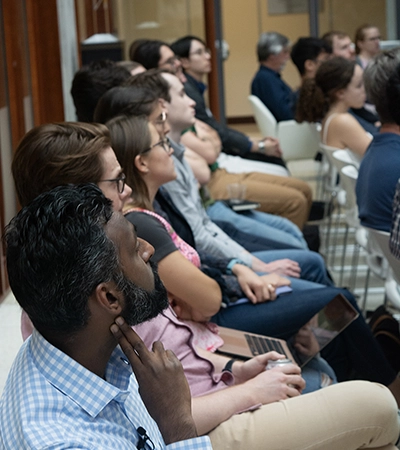Northwestern Partnering with Boston Venture-capital Fund to Boost Tech Startups
Northwestern is teaming up with Boston-based venture-capital fund in an effort to support its growing tech startup community
Trienens Institute and the Innovation and New Ventures Office (INVO) partner to support the future of Cleantech entrepreneurship and innovation.
“There’s an immense opportunity to bridge the gap between the incredible innovation landscape at Northwestern and the marketplace. Our goal is to cultivate collaboration and take our entrepreneurs from discovery to commercialization of ideas that help create a more sustainable future,” said Phillip Carter, Director of Strategic Alliances at the Innovation and New Ventures Office (INVO) at the Trienens-Q Cleantech Accelerator & Entrepreneurship event last week.
The event engaged cleantech industry experts, faculty, postdoctoral scholars, and graduate students for a panel discussion, and success stories of startups that began at Northwestern, and networking.
 Through the newly launched Trienens-Q Cleantech Accelerator Program, the Paula M. Trienens Institute for Sustainability and Energy and the Querrey InQbation Lab (The Q) are collaborating to create a clear path from idea design to commercialization.
Through the newly launched Trienens-Q Cleantech Accelerator Program, the Paula M. Trienens Institute for Sustainability and Energy and the Querrey InQbation Lab (The Q) are collaborating to create a clear path from idea design to commercialization.
Through the Accelerator, “our goal is to help catalyze the translation of the innovation coming out of Northwestern research laboratories to benefit the public and promote economic growth whether through new jobs or new products in the marketplace,” said Sonia Kim, Executive Director of the Querrey InQbation Lab.
The Accelerator is the newest addition to an ongoing partnership between The Q and the Trienens Institute that supports sustainability, energy, and climate innovation. Through it, researchers developing technologies with translational potential receive funding to address critical milestones and are embedded within targeted Q programming, which may include opportunities for mentorship, networking with external partners, and pitch feedback from potential investors and industry experts.
“The Trienens-Q Cleantech Accelerator program is an exciting model for how we can accelerate the translation of discovery and innovation in Northwestern laboratories to commercialization in the marketplace,” said Northwestern Vice President for Research Eric J. Perreault. “Our hope is for the Trienens-Q program to inspire the creation of similar accelerator programs in other disciplines across Northwestern to elevate the impact of our broad research portfolio.”
Socializing new ideas in the marketplace means researchers can address niche customer needs and align with broader industry trends. “Products based on Northwestern innovations are already in the marketplace—including Pfizer’s Lyrica, Gatorade’s Gx Sweat Patch, Stryker’s Citrelock Tendon Fixation Device, and new metal alloys found in the landing gear of fighter jets,” Kim shared.
Leveraging the expertise of Trienens Institute researchers in this space, the Trienens-Q Cleantech Accelerator Program supports projects related to decarbonization priorities including hydrogen storage, perovskite solar cell development, developing a circular economy for plastics, and more.
At the event, Research Assistant Professor Yosi Kratish shared his own success story launching a startup focused on recycling plastics like nylon with support from INVO and the Trienens Institute. Kratish and co-founder Professor Tobin Marks and their research team developed a special catalyst to break down postconsumer waste materials including fishing nets, carpets, plastic bags, and yoga mats into their most base form. “We are generating new, high-quality nylon from waste – this is true, infinite recycling,” said Kratish.
An idea with immense potential, Kratish worked with the team at INVO to identify risks, opportunities, and leading nylon companies to help bring it from the laboratory to the marketplace. “After pitching our catalyst to cleantech leaders, one said ‘this is the technology he wished he had access to ten years ago,’” Kratish remarked.
Through the accelerator program, Kratish and his team still engage with many of the same companies who have since joined the nylon startup and provided additional funding for future research.
During a panel discussion facilitated by Jeffrey Richards, assistant professor of chemical and biological engineering, attendees heard from cleantech leaders who work to support innovation and entrepreneurship.
Panelists included Shashank Churukanti (MEAS ‘12), Venture Associate at Evergreen Climate Innovations, Dr. Gami Maislin, Venture Partner at Convergent Ventures, and Ben Schlatka, Partner at Material Impact.
The panelists, who have built materials science and sustainability companies from the ground-up, shared insights on the various phases and paths they followed to develop and nurture cleantech startups.
As part of a new partnership between Material Impact and Northwestern, Schlatka will lend his expertise to faculty, students, startups, and entrepreneurs to accelerate breakthroughs in decarbonization, renewable energy, and sustainability. Material Impact, a venture capital firm focused on solving large-scale challenges through cutting-edge innovations in materials science, will join advisory committees and mentor fellows from Querrey InQbation Lab, Kellogg School of Management, as well as Q Entrepreneurial Fellows as part of the partnership.
“We are eager to support the next generation of groundbreaking technologies and solutions to help address some of our biggest challenges like climate change,” Schlatka said.
To get involved with sustainability innovation projects, garner commercialization support, or learn more about how the Trienens-Q Cleantech Accelerator Program, contact Innovation and New Venture Office (INVO) or the Trienens Institute.